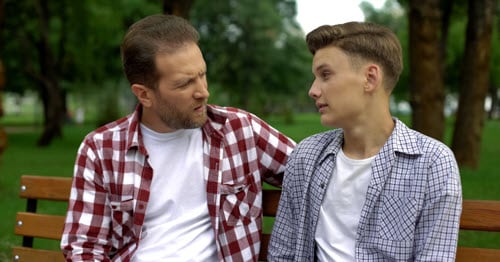What to Do When Your Child Feels Like a Failure
byCorissa Hennessey
4 min to read
Some of the world’s most successful people, including Albert Einstein, Oprah Winfrey, and Steven Spielberg, have all had their share of significant famous failures. What they all had in common, though, was the ability to see their failures as learning opportunities.
As a parent, you want your kids to be happy, successful, and confident. You’d do anything for them, including protecting them from the pain that often comes with failure. It’s a natural—and admirable—response. But what if failing, and the tough feelings that come along with it, could benefit your child in the long run?
What to Do When Your Child Feels Like a Failure
When your child is trying something new, and it doesn’t go the way they hoped, how you respond as a parent can make a significant difference in how they manage failure, now and in the future.
It’s important for parents to have a growth mindset—that is, you believe that intelligence and abilities are not fixed, and instead can grow through effort and perseverance—when communicating with their kids after a perceived failure. According to research by Kyla Haimovitz and Carol Dweck, children learn whether failure is positive or negative by observing parental response. For example, “parents who typically show anxiety and concern when their kids come home with a poor quiz grade may convey the belief that intelligence is mostly fixed. Parents who focus instead on learning from the poor grade, signal to their kids that intelligence can be built through learning and improvement.”
Here are some tips to apply the next time your child is feeling down about the outcome of their efforts:

1. Validate their desire to succeed.
First, address the feelings they are having in the moment. They might feel angry, sad, or down on themselves. Let them know that feeling disappointed is normal, even for adults, and that their desire to succeed is a great thing.
Global health services company Cigna shares some insight on their website into why it’s important to validate your child’s emotions:
- Helps your child feel seen, understood, and valued.
- Helps your child learn to identify their emotions and work through them.
- Shows your child that you’re someone they can trust with their feelings.
- Teaches your child to be more accepting of negative feelings. This can help them stay calm and handle those feelings when they happen.
When you validate how they feel, it gives your child an opportunity to process those feelings and move forward.
2. Respond positively to their failure.
Haimovitz and Dweck assert that parents need to not only believe in a growth mindset, but they must also respond to their children in accordance with this belief. In other words, even if you believe that children can improve and grow, responding with anxiety, frustration, or punishment will not teach them to believe they can succeed.
Instead, respond without negative feelings of your own. Smile, give them a hug if they ask for one, and let them know it’s okay. If they’re in a receptive state of listening, share with them a list of successful people’s failures and how they turned their experiences into success stories.
3. Emphasize effort over success.
Instead of placing all your focus on your child’s end goal, put more energy into emphasizing their efforts. Acknowledge their “right to fail,” how hard they’ve worked, and how much courage they have for even trying. This approach helps kids focus on their passions and the fun that can come with trying. After all, when it comes to trying something new, it’s more about the journey than the destination.

4. Help them identify what they can learn.
Ask them: “What is something you could try differently next time?”
When your child identifies what could be changed or tweaked about their approach, they will be able to see that the failure was due to how they approached their goal rather than the result of something inherently lacking within themselves.
If their next approach is still not successful, have a brainstorming session and ask them questions that will help them tap into their curiosity about their own process:
- What’s working well so far?
- What isn’t working well?
- What approach have others used to achieve the same goal?
- What have you learned so far in this process?
It’s important to teach kids not only how to win, but also how to lose. Failing can be a challenging experience, and sometimes it hurts. But failure teaches kids how to course-correct, think critically, and develop resilience. If at first your child doesn’t succeed, they will grow and become more skillful if they try and try again.
In a learning environment, it’s important for children to have educators who understand the growth mindset and can offer positive support when setbacks happen. Connections Academy teachers facilitate online learning with the belief that children can learn how to grow and gain confidence after a “failure.” Learn more about Connections Academy by requesting our free eGuide.



